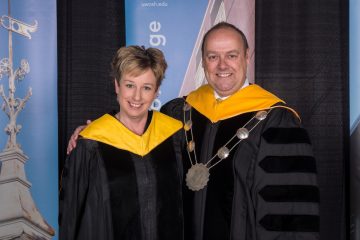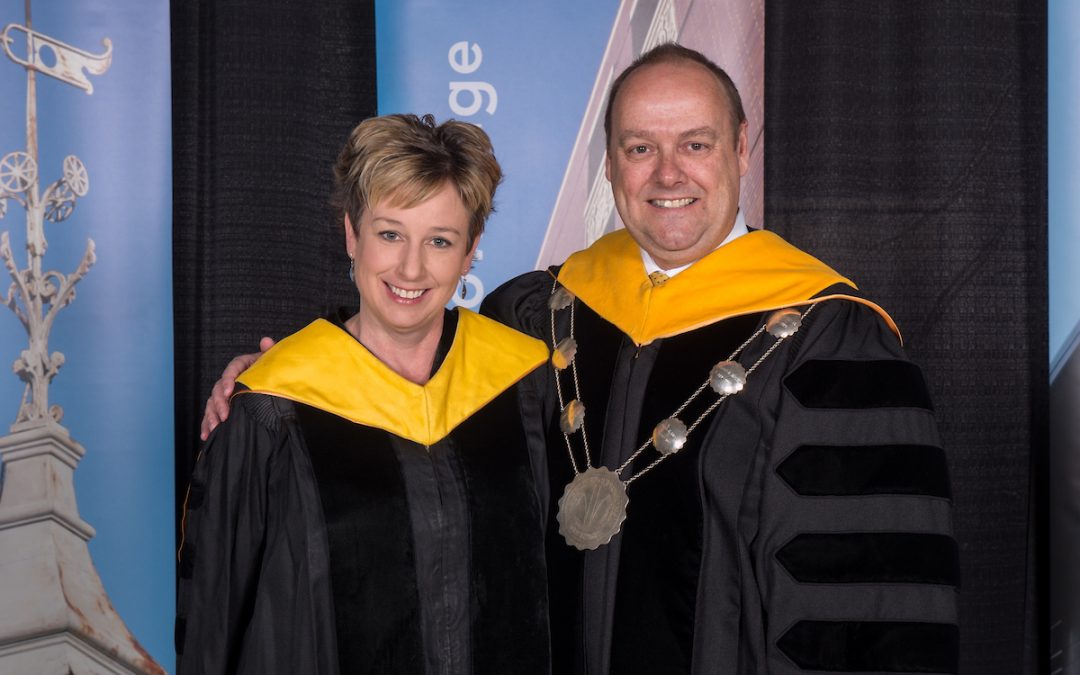 College of Letters and Science faculty member Jennifer Szydlik offered the following remarks at the University of Wisconsin Oshkosh’s morning spring commencement ceremony on May 12 at Kolf Sports Center:
College of Letters and Science faculty member Jennifer Szydlik offered the following remarks at the University of Wisconsin Oshkosh’s morning spring commencement ceremony on May 12 at Kolf Sports Center:
“I know. You are hoping I talk about math. I am sorry to disappoint you–but graduation speeches should be sweeping words of wisdom. I’m not sure how wise I am, but I have been thinking and writing and teaching at the University of Wisconsin Oshkosh for 28 years. And I do have my first colonoscopy scheduled for Tuesday. All of that suggests a certain age if not outright wisdom. So, with those credentials, I give you the five most important things I’ve learned in the past 50 years or so.
- “We humans don’t live in the physical world. We live in the world of our ideas. This world of ideas is much, much more real to us. Think of … Marriage. Money. Democracy. Friendship. Ideas, all of them. Country. Family. College Degrees. Where do these things exist? I say we created them together as a culture. We made them up, and they exist in our minds. And because they are ideas, they are fluid–we are always negotiating and updating them.
- “Even when we cannot control what happens, we CAN control what we make it mean. Here’s an example. When I was a graduate student, my adviser, Dr. John G. Harvey, set a terrifying deadline for my completed draft of my dissertation. It felt like came out of the blue. And I was really angry. He made me work 80-hour weeks for most of a term. And then a friend helped me to see the deadline as support. My adviser knew I was procrastinating, and he’d decided to support me in finishing even when it made him the bad guy – even when it was uncomfortable for him to do so. When I created that interpretation, that meaning, it made a difference. I wasn’t angry anymore. I felt supported. I finished that spring. 1995. And I will always be thankful for that deadline.
- “Declarative speech has immense power.
‘We hold these truths to be self-evident, that all men are created equal.’
‘I take you Stephen Szydlik to be husband. I will be true to you in good times and in bad, in sickness and in health, and I will love you and honor you all the days of my life.’
‘No matter how long it may take us to overcome this premeditated invasion, the American people in their righteous might will win through to absolute victory. I ask that the Congress declare that since the unprovoked and dastardly attack by Japan on Sunday, December 7th, 1941, a state of war has existed between the United States and the Japanese empire.’ – President Franklin D. Roosevelt
‘I… will … preserve, protect and defend the Constitution of the United States.’
“Declarations of Independence. Wedding Vows. Declarations of War. Oaths of office. All of that is declarative speech. If you want to accomplish a goal, then commit to it and declare it. Tell people what you are doing and why you are doing it and by when you’ll have it done. W. H. Murray (a Scottish a mountain climber) wrote:
‘Until one is committed, there is hesitancy, the chance to draw back – Concerning all acts of initiative (and creation), there is one elementary truth that ignorance of which kills countless ideas and splendid plans: that the moment one definitely commits oneself, then Providence moves too.’
“If you want to accomplish something, commit. And declare it.
- “You are not alone. You are part of a wider culture and, as such, you owe much to those around you. Not just the obvious people–parents, friends, teachers, your fans. You owe your larger community. Look around you. Your fellow Wisconsin tax-payers–along with a community of donors–funded about 40 percent of your education here at the University of Wisconsin Oshkosh. If you received any federal grants or scholarships, then it was more. They invested in you.
“Look at the people down here in this middle section. They spent plenty of hours preparing activities and lectures and assignments for you, meeting with you, thinking with you, worrying about you, giving you feedback.
“Not only do you owe these living, breathing people, but you owe a great intellectual debt to the generations who came before you, to people who created the ideas and the structure that make up our civilization. You should be proud of yourselves today. But you should also be thankful for the work of others.
- “We must–all of us–practice more empathy and more compassion. We are lucky. We are extraordinarily lucky to be here, in this place, at this time. We are lucky to live in a culture that values education as part of citizenship. A culture with roads and laws and coffee and science and math and art and literature and high-speed internet. A culture that allows both women and men to go to school. A culture that provides freedom and support for lots of ideas. We are not perfect by any means. But most human beings – past and present – are not so lucky. Don’t forget that. Be slow to pass judgment and quick to forgive.
“I’d like to take my own advice now, and give some meaning to this college degree that you have earned. It means that you have the power to read and research, to make sense of nuanced arguments and new ideas, to solve problems. It means you have the responsibility to check facts and examine arguments. You have the responsibility to listen to others, to learn from them, to teach, and to stand up with those not as lucky as you. You have a responsibility to be an informed and caring citizen of this state and this country. You owe this to your culture and your community and your university–and you owe it to yourselves.
And for those of you who recognized the quote I began earlier, and were disappointed to not hear the rest–that famous last part where Murray paraphrases Johann Wolfgang Goethe (I did my research.)–I’ll end with that:
‘Whatever you can do, or dream you can do, begin it. Boldness has genius, power, and magic in it. Begin it now.'”

